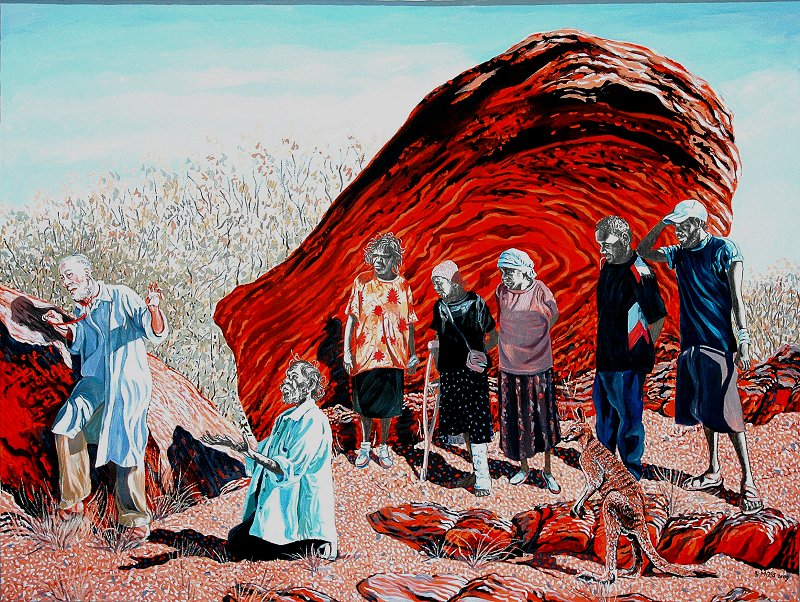Somehow the airline separates me from my wife. They allocate Annette seat number 21 C and they give me 22 B. Arriving at Row 22 I find seat B occupied by a young mum with a baby on her lap. The baby is asleep. The young woman explains: ‘The cabin attendant switched me so my Mom and I can sit together. Do you mind?’
I don’t mind at all.
The cabin attendant appears at my elbow. ‘Seat 22 E is free. Do you mind sitting there?’
I don’t mind at all.
I take my seat between a youngish man and a younger woman. He’s a muscular nugget. His fair facial bristles catch the morning sun and glow gold; she’s slim, no whiskers, café au lait skin. The man busies himself with his keyboard. I open my paperback. The lady smiles, says, ‘Hello’. I catch an accent, try to place it. Guessing she’s a Latina I prepare some Spanish. ‘De donde estais?’
‘Not from Espain. Not from any espanish speaking country. Try to guess.’
‘Slovenia?’
The smile widens. She shakes a lot of wavy hair: ‘No.’
‘Turkey?’
More hairshaking. She’s laughing now.
‘One more try.’
Guessing wildly I try Portugal. She laughs a merry laugh. ‘No. Saudi Arabia.’
Golly. No head covering, light brown hair, pretty conventional western dress.
‘She proffers a child’s hand: ‘My name’s Amy.’
Golly.
‘Hello, Amy. I’m Howard.’
‘What is your country, Howard?’
‘Australia.’
I give her time to absorb the incredible. Then, ‘You are Muslim?’
‘Yes, of course.’
I remove my cap, lean forward, reveal my yarmulke: ‘I’m your cousin.’
The smile widens. She’s delighted: ‘You are a religious man. I pray every day five times. I am estudent.’ She names her university in Los Angeles, a name not known to me.’ When in Saudi Amy wears her head covered, ‘only my face you can see.’
Amy tells me of her two brothers and her sister who are back in Saudi Arabia, with mother and father. A second sister is studying in LA with Amy. She points to a rich head of darker hair that crowns a quite ravishing face in a nearby row,
I spend some time pondering the life of a young Saudi woman on a US campus. A woman who dresses western and prays every day five times. Pretty brave, I suspect. And incidentally, pretty easy on the eye.
‘Amy, why do you take the risk of speaking candidly like this to a strange man?’
The head lifts and she regards me, smiling a little as to one who is naive: ‘Instinct.’
Back to my paperback. The young bloke types something about a baseball match. The young woman takes out some study sheets. I sight some highlighted terms familiar to me – homeostasis, perception, adrenergic flight/fight response. The head of wavy hair bends over the notes, a child-size finger traces the lines, her lips frame the foreign words.
‘What are you studying?’
‘Clinical Psychology. And what is your profession?’
‘I’m a doctor.’
‘That’s good. Maybe you can tell me what is homeostasis.’
I tell her what I understand by that term, the neologism I encountered first in 1965, a word that widened my mind.
Amy nods gravely and thanks me.
After a while Amy sets Clinical Psychology aside. She looks at my book and asks:’ Is that a good book?’
‘I think so, yes.’
‘But you do not know?’
The book won a Pulitzer. A close friend pressed it on me, saying: ‘Read it if you want to know DR.’
Do I like it? Not much. At least not yet. The plot, yes; the characters, yes yes yes. The style, not much.
Homeostasis is simpler to explain than ‘I think it’s a good book, but I do not know if I like it.’ A deep breath and I essay some literary criticism: ‘This book won America’s top award for literature. I think it gained attention for its unusual style of writing and for telling the modern history of the Dominican Republic in the story of one unfortunate family. The writing is bright, the story is dark. The language is lively, plenty of street talk. Every third word is nigger, every fourth word is fuck.’
I pause. No shock registers on the estudent’s face.
‘The characters are vivid and their story is dramatic. So, yes, I think it is a good book, an important book. Even ‘though I do not enjoy it much. Yet.’
‘You read many books?’
‘Yes, I do.’
‘Tell me please what books are good for me to read. Books you do like.’
She couldn’t give me a pleasanter task. The flight from Los Angeles to New York takes four hours. That might suffice. I speak of my favourite of all books written in the twentieth century. This is the book I read at Amy’s age ( I’m guessing here she’s as old today as I was fifty years ago): ‘The Leopard, an Italian novel of an aging aristocrat – you know? (Amy nods) – he sees the life he has known and loved, a life of privilege, passing. He knows that life will be lost.’
Amy remarks, ‘Life in my country is also changing… Slowly.’
Next I speak of Anna Karenina. ‘This is also an old book, more than one hundred years, written by another aristocrat, Leo Tolstoy. It tells the life of a woman who disobeys the rules of her society and obeys only her passion. She loves a man who is not her husband. I like this book very much; I respect Anna’s courage but I am angry at her too. I am angry because she turns her back on her son, a small boy.
‘It is an important book, one of the earliest books to give a woman strength, courage to make choices and to follow her own path.’
I watch Amy for signs of disapproval or discomfort. No sign of either.
‘Although I don’t entirely like Anna, the character, I like the book. The author shows us life. Like Shakespeare, he knows the good and the bad, the strong and the weak. He knows them and he shows them. He is not the judge, he gives us the life.’
‘And one more. This is maybe America’s most beloved book of the Twentieth Century. I love it very much. It is called, To Kill a Mockingbird. It is written by a woman, Harper Lee. The story is told in the voice of a small girl who lives in a town in America’s south at a time when many white people showed no respect for black people. The girl’s father is a lawyer who tries to save a black man who is accused of raping a white woman. You read this book and you love the father and you love the child.’
Amy asks me to write the names of the books she should read. It dawns on me I’ve recommended three books that challenge old norms. The books subvert male dominance, they chart the passing of feudalism and ancient authority, they show the rule of equal law.
I have lots of questions. Amy answers them readily. No she doesn’t go out with men (‘I am a good Muslim’), but she had been engaged to marry a man whom she chose. That was back in her home country. Later the engagement ended, the free decision of both. No hard feelings, no honour issues. It occurs to me Amy has found in Seat 22E a Father Confessor. I wonder about her vocation: I don’t know anyone who works in mental health who enjoyed an easy childhood.
The aircraft’s engines keep up a steady hum. Conversation is hushed and most passengers sleep. As Amy sits at the side of one of my deaf ears, there’s no lip-reading and I miss some of her speech. When I ask, ‘What work does your father do?’, I miss her reply. She repeats : ‘He’s a general in the Air Force.’
Golly.
She adds, ‘My mother is a school teacher.’
‘When you finish your studies will you return to your country?’
‘I will visit. My older sister has two babies. I must see them. But my life, I think maybe here in America. And my sister Sara, she is here.’
My mind races from question to question: Is Amy the right sort of Muslim – by the lights of the current President – to be admitted to the USA? What does Daddy the General think of Amy’s choices – dress, spouse, profession, place of residence? All her choices bespeak independence but in reality she must be completely dependent on Daddy. Amy has none of the bearing of the rebel – there’s nothing defiant in her speech – yet her Americanness must challenge Saudi norms. I think too of the engagement of the Saudi’s military – especially the Air Force – in the nasty war in Yemen. A Saudi general would be a serious man.
These are questions this old man does not ask. Meanwhile the estudent has put away her study notes, buried her head in a blanket, tucked her legs beneath her and, by some miracle of youthful calisthenics, made herself comfortable enough to sleep. For the next two hours the Princess of Araby slumbers in Seat 22F. She awakens as we descend, smiles, shakes my hand and asks, ‘When will I meet you again, Howard?’


